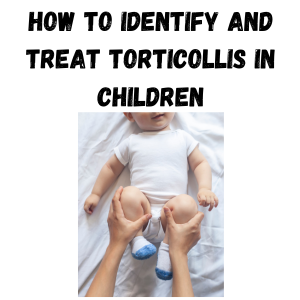
Torticollis, also known as “wry neck,” is a condition characterized by the tilting or twisting of the neck due to muscle tightness or spasm. It can be identified by observing certain signs and symptoms in individuals, including children. However, it’s important to note that proper diagnosis should be made by a medical professional. Here’s how you might identify torticollis:
Head Tilt or Rotation: One of the most noticeable signs of torticollis is the abnormal positioning of the head. The child’s head may be tilted to one side (ear closer to the shoulder) or rotated, causing their chin to point in a different direction than their body.
Limited Neck Mobility: Children with torticollis often have limited range of motion in their neck. Attempting to turn or tilt the head in the opposite direction of the tilt can be uncomfortable or even painful for them.
Preference for One Side: You might notice that the child consistently prefers looking in one direction and avoids turning their head to the opposite side.
Muscle Tightness: You might feel or notice tightness in the neck muscles on the affected side when touching or palpating the area.
Head Tilt During Movement: The head tilt might become more pronounced when the child tries to move or turn their head. This can be observed while the child is playing, eating, or attempting to look around.
Asymmetrical Head Shape: In some cases, prolonged torticollis can lead to flattening of one side of the back of the head (positional plagiocephaly) due to consistent pressure on one side.
Pain or Discomfort: The child might display signs of discomfort or pain when trying to move their head, or they might cry when their head is manipulated.
Irritability: Infants or young children might seem fussier than usual, especially when they try to move or if their head position is adjusted.
If you suspect your child might have torticollis, it’s important to consult a pediatrician or a pediatric chiropractor for a proper diagnosis and guidance. They will perform a thorough examination, possibly order tests if needed, and recommend appropriate treatment options, which might include stretching exercises, physical therapy, and other interventions such as chiropractic adjustments.
Click here to see a pediatric chiropractic adjustment on a child. Early intervention is crucial to prevent further complications and to promote proper neck muscle development. That being said, here are some general tips:
Consult a Pediatrician: If you suspect your child has torticollis, it’s crucial to consult a pediatrician or a healthcare professional. They can properly diagnose the condition and provide appropriate recommendations.
Stretching Exercises: Your child’s doctor or a physical therapist might suggest gentle stretching exercises to help alleviate the tightness in the neck muscles. Always follow their guidance as improper exercises could worsen the condition.
Positioning: Ensure that your child’s sleeping, sitting, and play positions are appropriate. Avoid prolonged periods of turning the head in one direction, which can exacerbate torticollis.
Tummy Time: Encourage tummy time while your child is awake and supervised. This helps strengthen neck and upper body muscles.
Heat and Cold Therapy: Applying a warm compress or cold pack (wrapped in a cloth) to the affected area might provide temporary relief. Make sure the temperature is comfortable and not too extreme.
Massage: Gently massaging the affected side of the neck might help relax the muscles. Consult a healthcare professional or a physical therapist for guidance on proper techniques.
Chiropratic Care: Chiropractic Adjustments can realign the spinal column by reducing angles and curvatures. Realigning the spine into its natural position balances the muscles that line the spine.
Physical Therapy: If the torticollis is severe or persistent, your child’s doctor might recommend physical therapy. A trained therapist can guide your child through exercises and techniques to improve neck mobility.
Remember, these are general suggestions and not a substitute for professional medical advice. Each child’s condition can vary, and it’s important to work closely with a healthcare provider to ensure the best care for your child’s specific situation.
If you live in Charlotte and are in need of a torticollis evaluation, check out Active Life Chiropractic. Our conservative treatments can reduce the severity of torticollis with with in office treatments and at home stretches.
Schedule with Active Life Chiropractic below
Just choose a date, “any service provider,” and services #1 or #2
